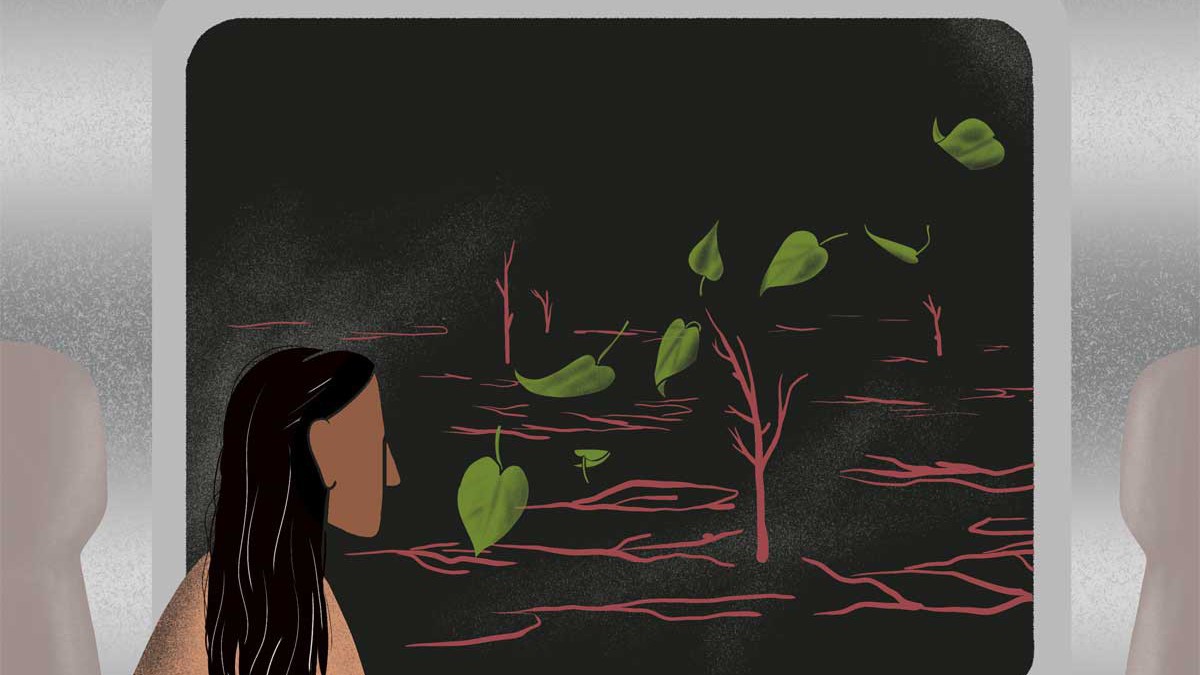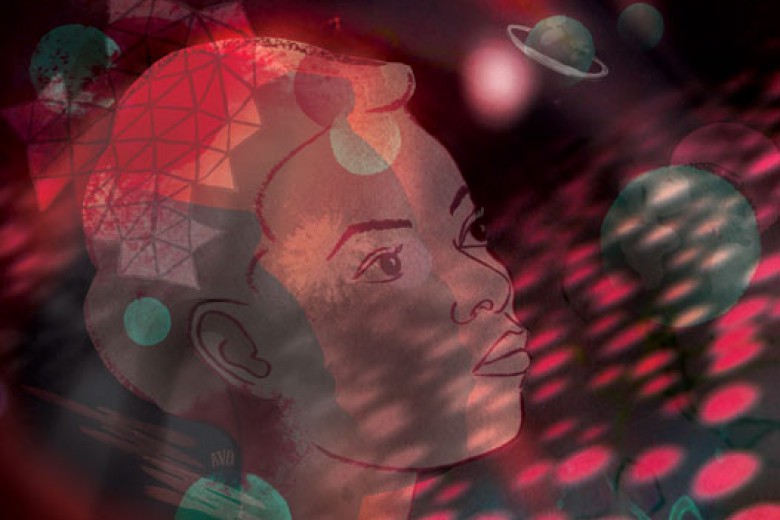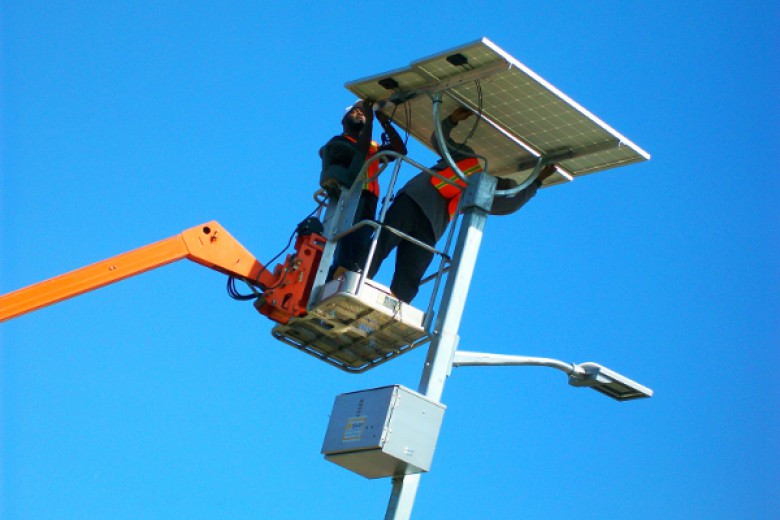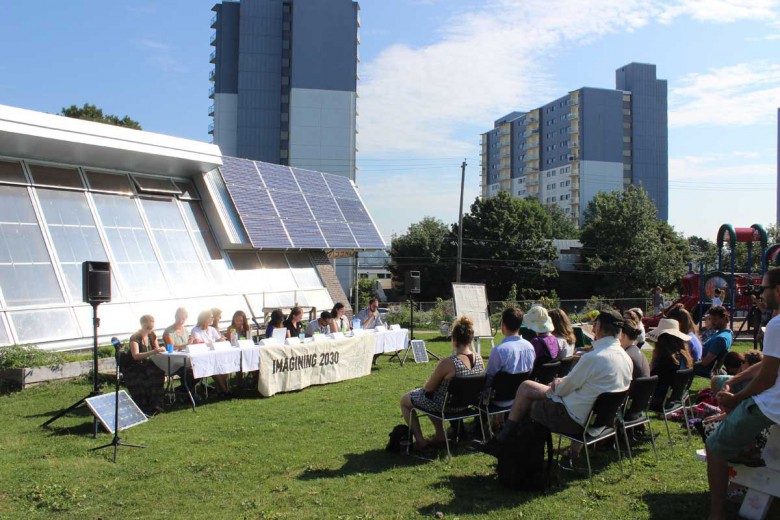Generations from today, a group of young activists sends a letter to a historian of the 21st century, hoping that she will be able to settle an argument about tactics. The historian’s response explores the hidden history of 21st-century struggles, the victories gained, the hard-won solutions, and the work still remaining.
Her letter exhorts the young activists to think in the long term, to think beyond the superficial, and gives us a glimpse of what life is like in the 22nd century – after a just transition.
Dear friends and comrades,
I was both pleased and surprised to receive your letter. I’m always happy to correspond with friends of the struggle. But, as a historian, it’s rare that I’m asked for counsel. Most people would rather not unearth and inspect the appalling events of the past hundred years. They say that what’s dangerous should stay buried. There are few who would scavenge the ashes for advice.
But there is much to learn from that difficult, complicated, uproarious century.
First, it’s never too soon to start. You asked whether, tactically, you should wait for a more opportune time. When community leaders are more sympathetic, the harvests better, the reservoirs fuller. But whenever we face a long struggle, the most opportune time to begin is now. If not yesterday.
So much of the strife and suffering of the 21st century could have been avoided if more people had dedicated themselves, earlier and more fully, to the correction of injustices that were old even then. Climate chaos was largely preventable. And yet, if you read their correspondence – as I have – so many people were kept distracted by commercialism, consumption, and spectacle.
Every generation thinks it is the pinnacle of human achievement. Two hundred years ago, people were already declaring the end of history. The “Great” War. Ha! The “Great” Depression. Double ha! The Great Transition would dwarf them all.
Strike up a conversation about the Great Transition at your local Carbon Exchange, or Soil Restoration Cluster, and you’ll notice: people already act like the world we live in today was a foregone conclusion.
But I was there, and it was not.
I was a baby in my mother’s arms during the Wide River Siege; if we had rallied even one fewer brigade, we’d have lost the siege, and the Indigenous Restitution Accord along with it. Think of the upheaval over the biosphere reserves. Or, a generation earlier, the first universal carbon dividend; 27 people died in those blockades, and that was considered a lot at the time.
Without the universal carbon dividend, corporations and financial speculators would have reaped the rewards of carbon limits, and workers would have fought against the transition instead of supporting it. Without the biosphere reserves, which sequestered carbon while providing food and ecological habitat, we could not have resurrected the Commons, could not have built a movement that put Indigenous peoples and landless settlers and peasants shoulder-to-shoulder on the barricades.
Our future was not saved by polite tinkering with the status quo.
It took enormous effort and dreadful sacrifice. But we were able to derail a future of catastrophic extinction. The expenditure of blood and sweat shaped everyone who survived. My mother told me of the vast crowds chanting: “Revolution! Restitution! Revolution! Restitution!” She whispered it in her sleep until her final days. The struggle has been long, indeed.
People already act like the world we live in today was a foregone conclusion. But I was there, and it was not.
If there is a second lesson from the 21st century, it’s that it is almost never too late to take action. It’s just that the longer we wait, the greater the difficulty in the action we must take.
We came within a hair’s breadth and still lost so much. Huge swaths of forest and grassland were clearcut, polluted, and baked to desert. But carbon farming will restore those soils, with time. It may take generations, but we can nurture those landscapes with perennial ecologies, graze them gently to restore their fertility, steward their streams, and build organic matter in their topsoil.
The inactivists of the 21st century did not understand that the best-case outcome of their complacency was to doom their children to a life on the precipice – where we’re living now.
Another super-El-Niño and the algae beds of the Pacific could wither and pump carbon dioxide back into the atmosphere. An unexpected solar maximum could push the southern poplar plantations into drought, and leave us again counting calories.
(Say, did you know that in the early 21st century, when people said “counting calories,” they actually meant trying to eat fewer calories? The guardians laugh when I tell them that. They think I’m making some kind of sick joke. But it’s true.)
In any case, life is life. There is always pleasure if you can find meaning and purpose. And as you know, there is never a shortage of purpose in a world on the brink. I have found plenty.
The inactivists of the 21st century did not understand that the best-case outcome of their complacency was to doom their children to a life on the precipice – where we’re living now.
As for your neighbours, well, that does sound frustrating. But I think you should do your best to work with them and – third – to look at your current challenges from the perspective of a historian. As time moves on, the past telescopes into itself. Things that were far apart slide together as they recede into the distance. If you had been alive in the 21st century, it would have felt like an eternity between the unsettling of the Prairies and the decarbonization skirmishes. But nowadays, most people could not tell you which of those things happened first.
So it is for ideologies. The Sisters of the Soil and the Ecological Brigades – in the moment, those minor differences seemed like vast gulfs. But now, who could say where they truly disagreed?
In any case, you should put your disagreement with your neighbours in context. In the archives, I work with hazardous data every day, sifting through the petabytes to understand how things went so wrong, how we can keep it from happening again. A neighbourly disagreement over tactics is nothing compared to the toxic and genocidal opinions that once proliferated in the news and social media.
A colleague of mine spent 10 years analyzing only 17 minutes of the 21st-century data dumps. We were trained to deal with the right-wing campaigns of hate and deception, with corporate AI that synthesized fake people to be sock puppets for authoritarianism. But it was the advertisements that finally made my colleague quit; they are endless. No wonder the people of the time, egged on to ever-greater heights of consumption, devoured so much of our world. But I digress.
Now, though, our accomplishments are energized by the gentle powers of wind and sun.
You asked, finally, whether you need a complete plan in order to begin. I say: we must know why we fight, but we will never know the outcome for certain. Humans live their lives facing backward. It’s like riding on a train in a rear-facing seat, staring out over a landscape we have already left. We can truly only know the past.
If we want to know the future, we must glimpse it, reflected, in the past. We search for a glint of hope in the very world that we are rushing away from. I find hope in the struggles I have mentioned. Where do you glimpse it?
Yes, we have lost a great deal in the last century. But think, too, of what we have gained: the carbon dividend, the equity algorithm, the perennial revolution!
All of these things give us meaning. They promise us a future.
The great “accomplishments” of the 20th century and the early 21st – whether good or bad – were fuelled by oil and colonialism, and doomed to be short-lived. Now, though, our accomplishments are energized by the gentle powers of wind and sun. By the freedom to learn and struggle, to exercise our creativity in fair and thriving communities.
All of this is still so fragile, ecologically and politically. Our society’s long history of injustices – patriarchy, capitalism, colonialism – cannot be papered over and will take generations more to truly correct. Our technology is now sustainable on the scale of decades, but not yet millennia, as the recent rare-earth skirmishes demonstrate. We have yet to fully transform our emergency mobilizations into enduring and intergenerational cultural and political systems that can immunize future generations against some new fascism.
But young activists like you give me the hope that our new ways will continue to grow and flourish for thousands of years to come, to stabilize the climate, to bloom into new cultures that even we cannot imagine. There is so much, still, to be done.
In any case, I hope to hear back on whether you have settled your argument. Further, you would be welcome to visit me. The trains stop only a few hours’ ride from here. The guardians will not let you take any sequestered data with you, of course, but it’s still worth a trip to look. Those of us who are left here would welcome some visitors, and it is connection that sustains our struggle and imbues it with meaning.
In solidarity, for past and future,
Alexa Wu-Morales
21st Century Archives and Hazardous Data







